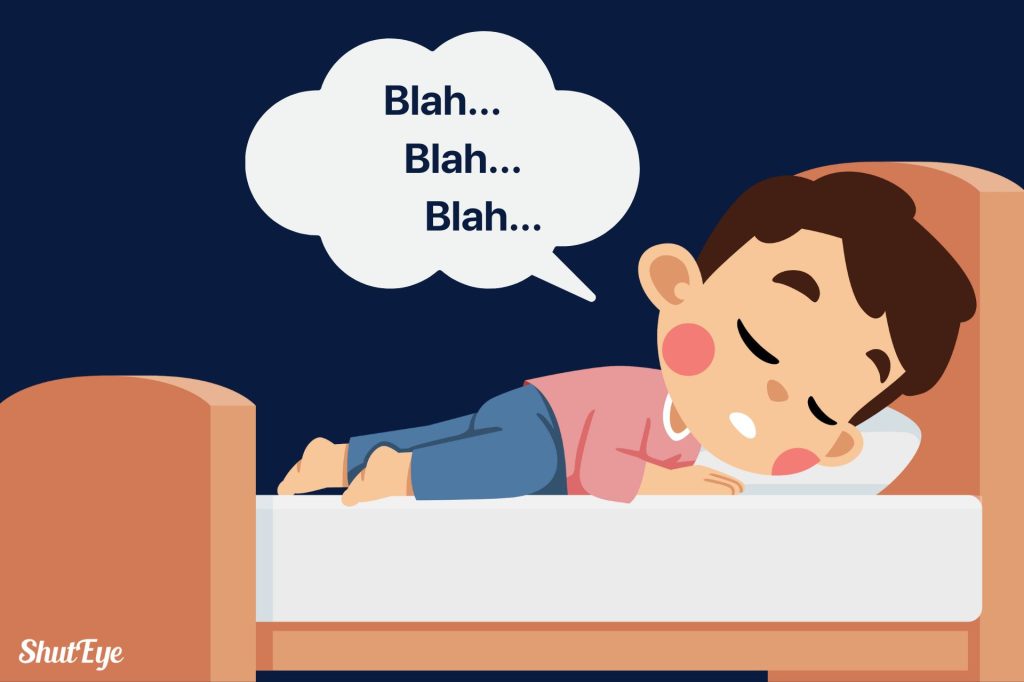


Sleep talking is not rare for people, it might be more common among children with neurosis and neurological instability.
The content of sleep talking is often similar to usual thinking, most of which is what you think about during the day. Let’s explore the sleep talking causes and treatments together.

Sleep talk or “somniloquy” is a type of parasomnia that can happen during any stage of sleep. It is defined as an unexpected vocalization that happens in the middle of sleep [1]. This vocalization could be gibberish, a word, or a full sentence.
According to the American Academy of Sleep Medicine, it is rather common for people to talk in their sleep, with a 60% to 65% chance of occurrence in a lifetime [2].
Sleep talking appears for various reasons. Severe sleep talking is a huge indicator of underlying sleep disorders.
The reason why sleep talking occurs suddenly is still unknown. However, theory suggests that it could be caused by genetics [3].
Some may also have a higher likelihood of sleeptalking if they have existing mental health conditions such as post-traumatic stress disorder (PTSD), depression, and anxiety.
Talking in your sleep is also associated with sleep apnea, sleepwalking, teeth grinding, and nightmares [3].
While experts have yet to figure out what causes sleep talking, some factors may contribute to its occurrence. This includes:
If you are a sleep talker who wants to know how to treat this sleep-talking habit from appearing frequently, here are 6 methods that you can try.

Diet plays an important role in your sleep quality. Eating a heavy meal just before bedtime and going to bed hungry can disrupt your sleep patterns.
When you sleep immediately after eating, there will not be enough time for the food to digest well. This may cause you to wake up in the middle of the night with digestive issues. Similarly, if you go to bed hungry, you may find yourself waking up to stomach growls and hunger pangs. This affects the way you sleep.

Cognitive Behavioral Therapy (CBT) can help to prevent the occurrence of stress-related sleep talking [5]. CBT works by identifying and addressing unhelpful thinking patterns to improve your overall behavior and well-being.
In the case of stress, it means identifying your stress triggers, keeping track of them, and finding a solution to it. Engaging in CBT can help you learn and develop relaxation and meditation techniques such as breathwork, visualization, or guided meditation [6].

Exercising can help to relieve stress and improve sleep quality. Start by doing simple exercises such as walking or jogging. You may also do all kinds of exercises like yoga, fitness, or gym workouts if you choose to. Pay attention to cultivating and improving your character. Take part in group activities, and develop a lively, cheerful, friendly, and social personality.

Set a sleep and wake schedule, making sure that you stick to it. Having a consistent sleep schedule helps to regulate your internal body clock or your circadian rhythm. A regulated circadian rhythm allows your brain to identify when it is time to sleep and wake up. This consistency and stability help reduce sleep-talking symptoms [7].

It is also best to avoid consuming any alcohol just before you are about to sleep. You are more susceptible to sleep-talking under the influence of alcohol. It can also affect your sleep quality at night. Hence, it is best to stay clear of it or consume only a glass during the day.

It is not easy to fall asleep if you are in an anxious or stressed state. Spending some time to relax your body and mind can help you to set the mood for bedtime. Taking a hot bath, reading a book or meditating are examples of relaxing activities.
Additionally, listening to music can help you to relax before and during your sleep. You can also set a timer for your music-playing device. ShutEye® has a huge selection of sleep sounds and sleep music, to ensure your sleep environment is as comfortable as possible.

Being bed partners or roommates with sleep talkers can be a frustrating experience, especially if it keeps happening throughout the night. Fortunately, there are a few strategies to help you sleep well even with disturbances [8]:
The above methods are to treat the symptoms but not the cause. If you experience severe sleep talking episodes, it is likely a sign of a more serious sleep disorder. In this case, you should consult with a sleep specialist.
For more tips on managing sleep talking or any other sleep-related tips, feel free to explore ShutEye® app. ShutEye® is a patented sleep-tracking solution with personalized insights to help you improve sleep quality.
American Academy of Sleep Medicine (2020) What is sleep talking? [online]. Available at: https://sleepeducation.org/sleep-disorders/sleep-talking/
Camaioni M, Scarpelli S, Alfonsi V, Gorgoni M, De Bartolo M, Calzolari R, De Gennaro L. The Influence of Sleep Talking on Nocturnal Sleep and Sleep-Dependent Cognitive Processes. J Clin Med. 2022 Nov 1;11(21):6489. doi: 10.3390/jcm11216489. PMID: 36362716; PMCID: PMC9658338.
Golden, A. (2021) All About Cognitive Behavioral Therapy (CBT) [online]. Available at: https://psychcentral.com/lib/in-depth-cognitive-behavioral-therapy
Lim, J. (2022) How to Sleep Better: 5 Tips to Improve Your Sleep Hygiene [online]. Available at: https://www.mountelizabeth.com.sg/health-plus/article/how-to-sleep-better
LaMotte, S. (2024) How to survive sleeping with a sleep talker [online]. Available at: https://edition.cnn.com/2024/05/09/health/sleep-talking-fixes-wellness/index.html
Pavlova, M. (2024) Why Do I Talk in My Sleep? [online]. Available at: https://www.massgeneralbrigham.org/en/about/newsroom/articles/why-do-people-sleep-talk
Ratan, NM. (2020) Causes of Somniloquy (Sleep Talking) [online]. Available at: https://www.news-medical.net/health/Causes-of-Somniloquy-(Sleep-Talking).aspx
Stevens, S. (2022) Talking in Your Sleep? Here’s What It Means [online]. Available at: https://psychcentral.com/health/sleep-talking